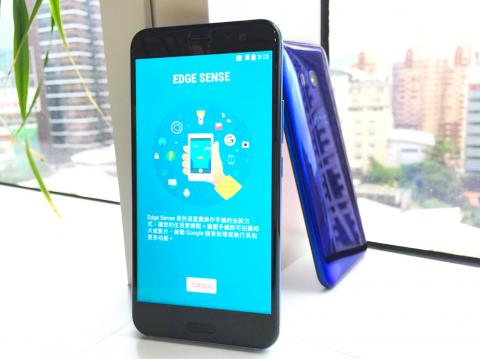Taiwanese smartphone vendor HTC Corp (宏達電) yesterday unveiled the HTC U11, a new flagship handset, at the company’s headquarters in Taipei, with the firm hoping the model sparks a turnaround in its loss-making smartphone business.
The introduction of the high-end product is timed to mark HTC’s 20th anniversary, HTC said.
“We chose to launch the U11 today as it represents the beginning of another 20 years of HTC,” HTC president of smartphone and connected devices business Chang Chia-lin (張嘉臨) told a global news conference.

Photo: CNA
The 5.5-inch U11 is powered by Qualcomm Inc’s latest Snapdragon 835 processor. It features a curved all-glass body. The edges of the device are touch-sensitive, allowing users to squeeze them to take photographs or open applications.
In addition to the voice-controlled Google Assistant, the U11 is to offer access to Amazon.com Inc’s Alexa in the US, UK and German markets from July, the company said.
The handset would also support Baidu Inc’s (百度) Baidu DuerOS from next month, Chang said.
The company started to manufacture the U11 on Monday and the product is to be available in its home market and Hong Kong from next week, Chang said, adding that it would hit the European, US and Chinese markets at the end of this month and the beginning of next month.
HTC hopes that the handset will help improve its smartphone business this quarter, Chang told investors during a teleconference on Monday last week.
Founded in 1997, the company in 2007 launched its first-ever smartphone, the HTC Touch. Its handset business reached a peak in 2011 and its stock price hit its historic high of NT$1,300 in April of that year.
HTC swung into the red in the second quarter of 2015 due to intensified competition and a slowdown in the smartphone industry. It has posted losses for the past eight consecutive quarters.
The company’s net loss totaled NT$2 billion (US$66.41 million) last quarter, or NT$2.47 per share.
The company is to centralize its resources by introducing only five or six high-end smartphones this year and phasing out its low-priced models, Chang said.
The U11 is the company’s third high-end product this year, meaning that the company intends to launch two or three more models before the end of the year.
In an effort to promote its latest offering, HTC for the first time invited more than 300 domestic and foreign journalists and bloggers to visit its plant in Taoyuan on Monday.
HTC showed the production line of the U11, including surface mount technology (SMT), assembly, testing and packaging.
The SMT and testing processes are completely automated, but the assembly is still done by people, HTC said.

Meta Platforms Inc offered US$100 million bonuses to OpenAI employees in an unsuccessful bid to poach the ChatGPT maker’s talent and strengthen its own generative artificial intelligence (AI) teams, OpenAI CEO Sam Altman has said. Facebook’s parent company — a competitor of OpenAI — also offered “giant” annual salaries exceeding US$100 million to OpenAI staffers, Altman said in an interview on the Uncapped with Jack Altman podcast released on Tuesday. “It is crazy,” Sam Altman told his brother Jack in the interview. “I’m really happy that at least so far none of our best people have decided to take them

BYPASSING CHINA TARIFFS: In the first five months of this year, Foxconn sent US$4.4bn of iPhones to the US from India, compared with US$3.7bn in the whole of last year Nearly all the iPhones exported by Foxconn Technology Group (富士康科技集團) from India went to the US between March and last month, customs data showed, far above last year’s average of 50 percent and a clear sign of Apple Inc’s efforts to bypass high US tariffs imposed on China. The numbers, being reported by Reuters for the first time, show that Apple has realigned its India exports to almost exclusively serve the US market, when previously the devices were more widely distributed to nations including the Netherlands and the Czech Republic. During March to last month, Foxconn, known as Hon Hai Precision Industry

PLANS: MSI is also planning to upgrade its service center in the Netherlands Micro-Star International Co (MSI, 微星) yesterday said it plans to set up a server assembly line at its Poland service center this year at the earliest. The computer and peripherals manufacturer expects that the new server assembly line would shorten transportation times in shipments to European countries, a company spokesperson told the Taipei Times by telephone. MSI manufactures motherboards, graphics cards, notebook computers, servers, optical storage devices and communication devices. The company operates plants in Taiwan and China, and runs a global network of service centers. The company is also considering upgrading its service center in the Netherlands into a

Taiwan’s property market is entering a freeze, with mortgage activity across the nation’s six largest cities plummeting in the first quarter, H&B Realty Co (住商不動產) said yesterday, citing mounting pressure on housing demand amid tighter lending rules and regulatory curbs. Mortgage applications in Taipei, New Taipei City, Taoyuan, Taichung, Tainan and Kaohsiung totaled 28,078 from January to March, a sharp 36.3 percent decline from 44,082 in the same period last year, the nation’s largest real-estate brokerage by franchise said, citing data from the Joint Credit Information Center (JCIC, 聯徵中心). “The simultaneous decline across all six cities reflects just how drastically the market